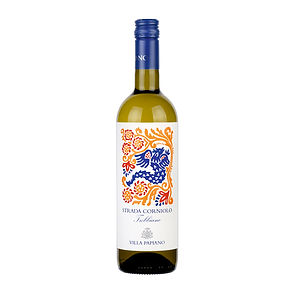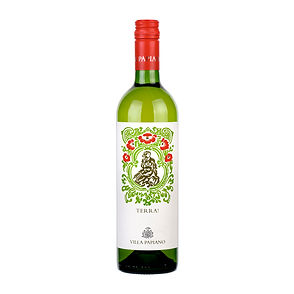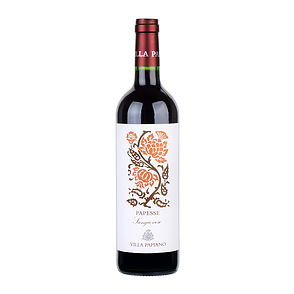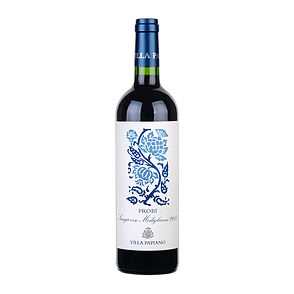VILLA PAPIANO
EMILIA-ROMAGNA / Modigliana
Modigliana, an unknown yet mesmerizing microclimate nestled within the steep slopes and ancient soils of marl and sandstone, is a terroir yet to be fully discovered and appreciated by the connoisseurs. The region, defined by its lofty elevation, high radiation, and the dense forest enveloping its three valleys, is a wild and enchanted oasis steeped in the rich tradition of agriculture and winemaking.
Villa Papiano, situated at the juncture of Romagna and Tuscany on the southern face of Mount Chioda in the Ibola Valley - the valley characterized by the most abundant forest of the three - is a bastion of biodiversity and environmental preservation.
Spanning 8 hectares, their vines, planted on terraces between 450-570 meters above sea level, are the highest in the region. The estate is currently managed by the four siblings of the Bordini family, with winemaker and famed agrologist Francesco at the helm.
At Villa Papiano, reverence for the pristine environment, nature, and cultural heritage is at the core of their farming philosophy. They specialize in indigenous varieties and low-yielding old clones, with Sangiovese as their flagship grape, followed by Albana, and ancient native varieties such as Centesimino, Negretto, and Balsamina. The vines are trained using the traditional alberello system and espalier method to maximize heat absorption from the ground. All vines are dry-farmed without irrigation, and the estate is certified organic, with some biodynamic preparations and minimal copper usage. In the cellar, wines are vinified solely with indigenous yeasts and feature minimal SO2, almost always below 40mg/l. These wines are vegan-friendly and aged in a blend of concrete, terracotta and oak. These wines are a testament to the exceptional and one-of-a-kind terroir and environment of Modigliana.
Owner
Region
Sub-region
Farming
Harvest
Vineyard size
Grapes Grown
Website
Vineland Rep.
Bordini family: Francesco, Maria Rosa, Giampaolo and Enrica
Emilia-Romagna
Modigliana
Organic & Biodynamic
Manual
9 hectares
Trebbiano, Romagnoli,
Reach out to confirm your country availability

Villa Papiano 'Strada Corniolo'
Marine, saline and nuanced, with hints of forest undergrowth.
Appellation: Romagna DOC Trebbiano
Grapes: 100% Trebbiano, Romagnoli and Apennine clones
Farming Method: Organic & Biodynamic
Vineyards: Single vineyard planted in 1960, restored in 2010.
Soil: sandy, sandstone-derived soils.
Vinification: Spontaneous fermentation with native yeasts.
Aging: 8 months in concrete and tonneaux on fine lees. 12 months refinement in bottle.
First vintage: 2017
Notes: Remarkable energy and verve here, with a kind of intensity that you can't quite put your finger on. It speaks of the dense forest that surrounds the vines and the limestone soils the vines are rooted, simultaneously saline and marine, with the scents of pine oil, greengages, a dash of pineapple and fresh green herbs. It's both textural and crisp, and very long, and so mouth-watering. For those that like fine Austrian rieslings and white burgundy, mineral chablis, made in the cool, delicate way, this may well resonate.

Villa Papiano TERRA!
Inviting and fresh, with fleshy stone fruits.
Appellation: Sillaro IGT
Style: Orange Wine
Grape: 100% Albana
Farming Method: Organic & Biodynamic
Average age of vines: 50 years
Vineyards: in Modigliana
Soil: Sandstone and Marl
Vinification: Spontaneous Fermentation in Amphorae with 3 months skin contact.
First vintage: 2013
Notes: A thick-skinned varietal, Albana has been cultivated since the Roman times, and often produced in a passito style. Terra! is Villa Papiano’s dry Albana, fermented in Amphora with 3 months of skin contact. Tense like a violin string, it showcases the variety’s classic acidity in a very pleasant form, with notes of apple chips, rosemary, apricots and stone fruit.

Villa Papiano 'Vigna Papesse'
Villa Papiano produces a truly noble example on a south-facing slope 500 meters high above a remote valley. The highest vineyard in the region, near the border of Tuscany. A wild area in the Apennines, where wolves prey on sheep and deer. "The vineyard above the clouds."
Appellation: Romagna DOC Sangiovese Modigliana
Grapes: 95% Sangiovese, 5% Balsamina & Negretto
Farming Method: Organic & Biodynamic
Vineyard location: in Modigliana
Soil: Sandstone and Marl
Vinification: Spontaneous with native yeasts.
Aging: Maturation 6 months in concrete vats, 6 refinement months in bottle. Unfiltered.
First vintage: 2002
Notes: The Wine Sourced from one of the oldest single vineyards at Villa Papiano, “Papesse” is a classic expression of Sangiovese from Romagna. Grown on the sandstone soils of the Apennines at over 500 m of altitude, it offers a ton of crushed wild berries wrapped in savory mineral notes. The cold mountain climate allows for a refreshing, mouth-cleansing acidity that balances out the firm tannins.

Villa Papiano 'Vigna Probi' Riserva
Complex and densely-aromatic: pomegranate, orange, and mandarin, iodine and humus.
Appellation: Romagna Sangiovese Riserva DOC
Grape: 100% Sangiovese
Farming Method: Organic & Biodynamic
Vineyards: in Modigliana
Soil: Sandstone and Marl
Vinification: Spontaneous Fermentation in stainless steel.
Aging: Maturation in concrete vats and large oak barrels for 12 months and 24 months refinement in bottle
Alcohol: 13.5%
Notes: A phenomenal mountain expression of Sangiovese that outperform many best Chiantis or Brunello. Berries, leather and a sprinkle of brown sugar on the nose that carries through to the palate, with blood orange, the sweet earthy smell of soil after the rain, tobacco and an almost candied, roasted beetroot aroma. The tannins are fine and there's that striking saline backbone that all the Papiano wines share as imparted from the unique terroir, and a very long finish.

Villa Papiano ‘Papiano’ Centesimno
The Centesimino grape variety is a true treasure among the ancient, indigenous grape varieties of Italy. Discovered in an ancient vineyard in the 1940s, it is one of the few remaining ungrafted Vinifera grape varieties in the world. On the Villa Papiano, the Centesimino vines are planted at a height of almost 500 meters on limestone-rich sandstone.
Francesco Bordini, the head of the winery, harvested his first vintage of Centesimino in 2001. Since then, these few rows of vines have produced a limited annual yield of around 2000 bottles. The unique characteristics and history of these old grape varieties make them a fascinating addition to the winery's portfolio.
Appellation: IGT Forlí Centesimino
Grapes:100% Centesimino
Soil: sandy, sandstone-derived soils.
Vineyard: Vineyards planted in 1980, 480m asl.
Vinification: Spontaneous fermentation with native yeast.
Aging: 18 months aging in bottle’
First vintage: 2001
Remark: Limited production of 2.000 bottles a year.
Notes: Centesimino grapes have small berries that grow in tightly packed, compact bunches. This results in a wine that is dark in color with prominent tannins that require skilled extraction techniques. The wine produced from Centesimino grapes grown on the Villa Papiano has an earthy aroma with cool undertones, reminiscent of a forest floor. It also has a minerality that is robust and fruity, with notes of balsamic and old-fashioned cherry jam, cand fruits and fresh red berries. The Centesimino grape variety is truly capable of producing a truly unique and complex wine that showcases its rich history and potential.

























